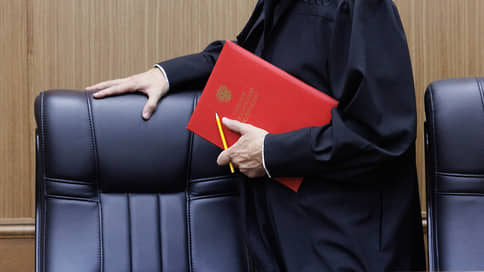Only 258 judges out of 1,115 have been appointed to the courts of the new regions, but this will not prevent them from starting work
[ad_1]

This week, federal courts will open in the territories of the Donetsk and Lugansk People’s Republics (DPR and LPR), as well as Zaporozhye and Kherson regions. This decision was made on Tuesday by the Supreme Court of Russia. The judicial system of the new regions is so far only a quarter staffed, but this is not an obstacle to the process of their integration, the highest court is confident. The initiative of the Supreme Court was supported by the Ministry of Justice and the Prosecutor General’s Office.
The plenum of the Supreme Court (SC) on Tuesday determined September 21 as the day the federal courts began operating in the territories of the DPR, LPR, Zaporozhye and Kherson regions. Let us recall that justice in new regions is still administered by the courts that were operating there at the time of their admission to the Russian Federation, and the transition period, during which all integration processes must be completed, will last until January 1, 2026. According to the law, it is the RF Armed Forces that must determine when the courts created according to Russian rules will begin to operate in each subject. A month ago, accepting the Order of St. Andrew the First-Called from the president, Chairman of the Supreme Court Vyacheslav Lebedev reported that the start of work of a number of courts in new regions would be announced in September, and he kept his promise. To ensure the transition, the High Qualification Board of Judges (HQJC) “has moved away from its usual work schedule and works as applications are received, so that the appointment procedure is not delayed in any case,” Mr. Lebedev indicated.
Indeed, from May, when the selection of judges for new regions began, until the end of August, the Higher Qualification Commission, according to data published on its website, considered almost 600 requests from candidates and made recommendations for the appointment of 436 of them. At the beginning of September, the availability of another 404 judicial vacancies in new regions was announced; documents from those wishing to fill them will be accepted until October 9. The law establishes a special procedure for selecting candidates for the initial composition of the courts of the DPR, LPR, Zaporozhye and Kherson regions: the judges who were active at the time of accession receive a preferential right to fill their own positions – of course, provided that they meet the established requirements.
Despite such a massive call, the courts of the new regions are still staffed with only a quarter of the regular number, which is 1,115 people. As First Deputy Chairman of the Supreme Court Petr Serkov said at the plenum meeting, 258 judges have been appointed in four regions, and the appointment of another 152 candidates is expected “in the near future.” However, Mr. Serkov noted, the law does not establish any requirements for the ratio of staffing and actual numbers. The largest judicial corps is so far in the LPR, where 125 judges have already been appointed, the smallest is in the Kherson region (10). Representatives of the Prosecutor General’s Office and the Ministry of Justice stated that they support the decision of the Supreme Court. “The adoption by the plenum of the Supreme Court of decisions on the start of the activities of federal courts on the territory of four new subjects will ensure access to justice and fully integrate the regions into the single legal space of the country,” emphasized Deputy Prosecutor General Igor Tkachev.
Kommersant’s interlocutor in the Supreme Court is confident that at the current stage the courts, even if they are short-staffed, are quite capable of coping with the current load – in the current conditions it is not too great, he explains.
According to federal laws on the creation of courts in new regions, cases and complaints that previously existing authorities accepted for proceedings, but did not have time to consider, must be transferred for consideration by new courts, taking into account their territorial and subject jurisdiction. If such cases end up before the same judges who considered them before the transfer, then the judicial proceedings continue from the stage at which they were interrupted. If at least one of the previous judges cannot participate in the process, then a new composition of the court must be formed and the trial will begin from the very beginning. In addition, the law establishes a special procedure for the application of the Criminal Code and the Code of Criminal Procedure in new territories: in particular, the criminality and punishability of acts committed before September 30, 2022 (the date of accession to Russia) is determined on the basis of the Russian Criminal Code. However, such actions may not be considered criminal if the court decides that they were aimed at protecting the interests of the Russian Federation or these regions themselves.
[ad_2]
Source link








